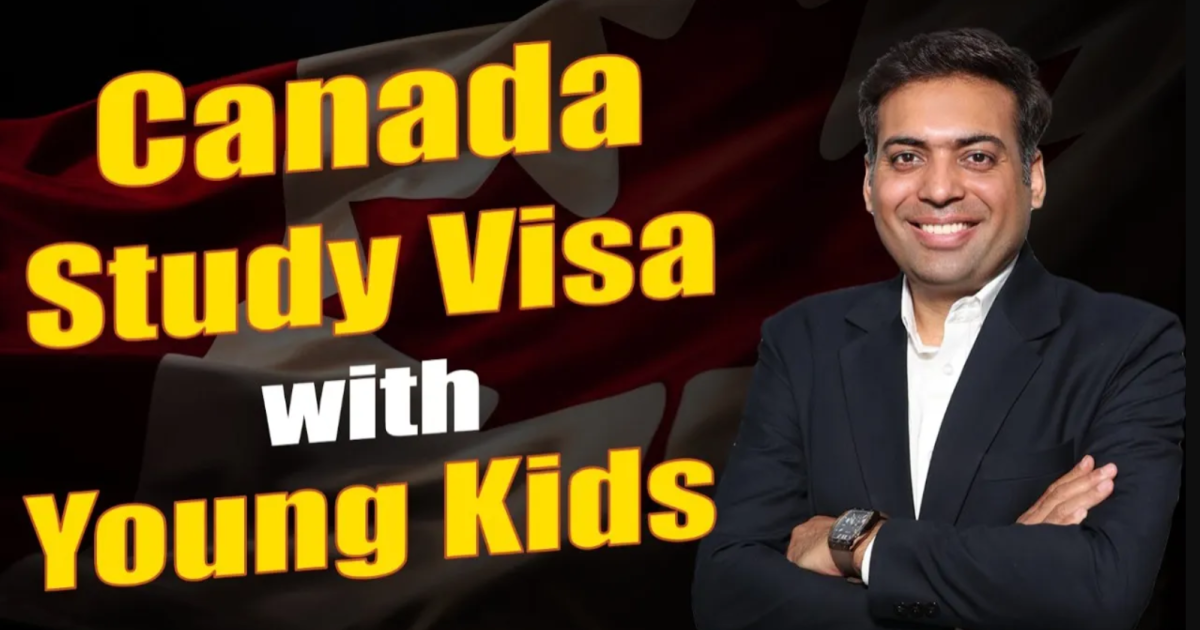Table of Contents
ToggleCanada Study Visa with Young Kids: A Complete Guide for International Student Parents

For many international students, the opportunity to study in Canada is a life-changing step. But what if you’re not just a student—you’re also a parent? The good news is that Canada welcomes international students with dependent children, offering pathways that allow families to stay together while pursuing education. If you’re planning to study in Canada and want to bring your young kids, this guide by Globexa Immigration covers everything you need to know—from visas and school admission to healthcare and settlement.
1. Can International Students Bring Their Children to Canada?
Yes, international students in Canada can bring their dependent children, including infants, toddlers, and school-going kids. A dependent child, according to IRCC (Immigration, Refugees and Citizenship Canada), is:
Under 22 years old
Unmarried and not in a common-law relationship
Financially dependent on the parent
This means that whether your child is 6 months or 16 years old, they can accompany you to Canada during your study period.
2. Visa Types for Children of International Students
The type of visa your child needs depends on their age and purpose of stay:
1. Visitor Visa (Temporary Resident Visa – TRV)
For children not of school age (typically below 5 years), a visitor visa is suitable. This visa allows them to stay in Canada legally while you study. It is usually granted for the duration of your study permit.
2. Study Permit
If your child is school-aged (5+ years) and will be attending a public or private elementary or secondary school, they’ll need a study permit. However, they are exempt from providing a Letter of Acceptance (LOA) from a school if their parent is already approved for a study or work permit.
3. Essential Documents Required for Your Child's Visa
When applying to bring your child, ensure you prepare the following documents:
Child’s passport (valid for the duration of stay)
Birth certificate showing parent-child relationship
Your study permit or Letter of Acceptance (LOA)
Financial documents (bank statements, GIC, sponsorship, income proof)
Letter of explanation stating why the child is accompanying you
Custodianship declaration (if applicable)
Medical exam results (if required by IRCC)
At Globexa Immigration, we review every document thoroughly to ensure zero visa delays and 100% accuracy.
4. Financial Requirements for Bringing Your Child
Bringing your child with you to Canada means you must prove you can support them. The minimum annual funds required (in addition to your tuition fees) are:
$10,000 CAD for the student (yourself)
$4,000 CAD for the first dependent (child)
$3,000 CAD for each additional child
Example:
If you are coming to Canada with two children, you need to show at least $17,000 CAD/year in addition to your tuition.
5. Accommodation Tips for Student Parents
If you’re moving to Canada with young children, housing should be family-friendly, safe, and close to schools or daycare centers.
Accommodation Options:
On-campus family housing (limited availability)
Off-campus rentals (apartments, townhouses)
Basement units in residential areas
Homestay (if you’re arriving first before your child joins)
Tip: Choose accommodation near a public school or childcare center to make daily life easier.
6. Schooling for Your Kids in Canada
Canada’s education system is among the best in the world. Children of international students can study in:
Public elementary and secondary schools (usually free)
Private schools (tuition fees apply)
French or English curriculum (depending on the province)
Admission Requirements:
Child’s passport and visa
Proof of residence (rental lease, utility bill)
Immunization records
Parent’s study permit
Some provinces like Ontario and British Columbia automatically allow free education for dependent children of study permit holders.
7. Childcare & Daycare for Toddlers and Babies
If your child is below school-going age, you’ll need daycare services while you attend classes.
Types of Childcare:
Licensed Daycare Centers
In-home Care
Private Babysitters
Family Childcare Homes
Cost:
Daycare fees range from $800 to $1,500 CAD/month, depending on the province and facility.
8. Healthcare for Children of International Students
Access to healthcare for your child depends on the province you’re studying in. In many provinces, dependent children are eligible for free provincial healthcare if the parent has a valid study permit.
Provinces that commonly provide healthcare to children:
British Columbia (MSP)
Alberta (AHCIP)
Ontario (OHIP) – may require private insurance for the first 3 months
If public healthcare is not immediately available, you can purchase private health insurance for your child.
9. Spouse Open Work Permit (Bonus for Families)
If you’re bringing your child, your spouse or partner can also accompany you on an Open Work Permit (OWP). This allows your partner to work full-time in Canada while you study, helping to support the family financially.
10. Post-Graduation: What Happens to Your Child?
After you complete your program:
You may apply for a Post-Graduation Work Permit (PGWP)
Your child can continue studying in Canada
You can eventually apply for Permanent Residency (PR) under streams like CEC or PNP
Your entire family, including your kids, can be included in your PR application
11. Common Mistakes to Avoid
Incomplete birth certificates or documents with name mismatches
Insufficient funds shown for dependents
Applying separately instead of together (can delay processing)
Ignoring local school district rules
Not purchasing private insurance if required
At Globexa Immigration, we’ve seen these errors derail many applications. Trust our experienced team to prepare a complete, accurate, and well-presented application.
12. Let’s Bring Your Family to Canada – Together!
Ready to start your Canadian journey with your child? Let Globexa Immigration make the process seamless for you.

